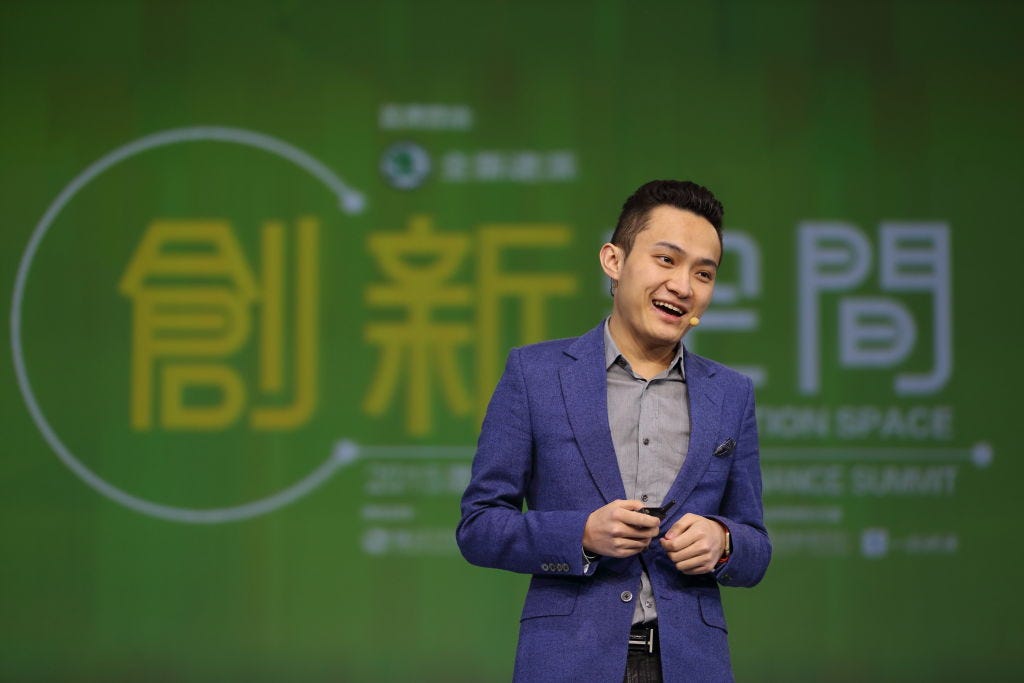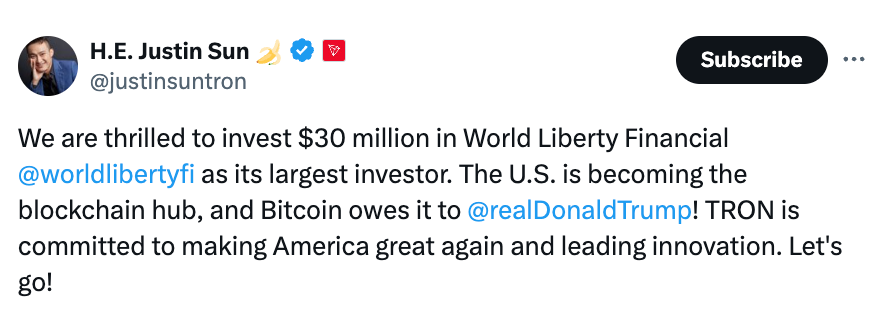A Chinese national, charged with fraud by the SEC, just sent Donald Trump $18 million

Chinese Crypto entrepreneur Justin Sun paid $6.2 million for a banana — sold by Sotheby's as conceptual art — and then ate it last Friday.
The banana is not Sun's most notable recent purchase.
On November 25, Sun purchased $30 million in crypto tokens from World Liberty Financial, a new crypto venture backed by President-elect Donald Trump. Sun said his company, TRON, was committed to "making America great again."
World Liberty Financial planned to sell $300 million worth of crypto tokens, known as WLF, which would value the new company at $1.5 billion. But, before Sun's $30 million purchase, it appeared to be a bust, with only $22 million in tokens sold. Sun now owns more than 55% of purchased tokens.
Sun's decision to buy $30 million in WLF tokens has direct and immediate financial benefits for Trump. A filing by the company in October revealed that "$30 million of initial net protocol revenues" will be "held in a reserve… to cover operating expenses, indemnities, and obligations." After the reserve is met, a company owned by Donald Trump, DT Marks DEFI LLC, will receive "75% of the net protocol revenues."
So before Sun's purchase, Trump was entitled to nothing because the reserve had not been met. But Sun's purchase covered the entire reserve, so now Trump is entitled to 75% of the revenues from all other tokens purchased. As of December 1, there have been $24 million WLF tokens sold, netting Trump $18 million.
Sun is also joining World Liberty Financial as an advisor, making Sun and the incoming president business partners.
While Trump has the cash, Sun's tokens are effectively worthless. To comply with U.S. securities law, WLF tokens are "non-transferable and locked indefinitely in a wallet or smart contract until such time, if ever, [WLF tokens] are unlocked through protocol governance procedures in a fashion that does not contravene applicable law." The only thing that Sun can do with his tokens is participate in the "governance" of World Liberty Financial. Right now, the only thing World Liberty Financial does is sell tokens.
Any foreign national paying an incoming president $18 million weeks before entering the White House should raise red flags. Sun's purchase is even more alarming because the Securities and Exchange Commission (SEC) is currently prosecuting him for fraud.
The SEC's ongoing prosecution of Sun
On March 22, 2023, the SEC charged Sun and three companies he owns. The SEC accused Sun of marketing unregistered securities and "fraudulently manipulating the secondary market" for a crypto token "through extensive wash trading." Wash trading involves "the simultaneous or near-simultaneous purchase and sale of a security to make it appear actively traded without an actual change in beneficial ownership." In other words, according to the SEC, Sun made it seem like there was a lot of interest in crypto tokens he issued when much of the trading was fraudulent and manufactured by Sun.
The SEC also charged Sun with "orchestrating a scheme to pay celebrities to tout" his crypto tokens "without disclosing their compensation." Federal law requires people who endorse securities to "disclose whether they received compensation for the promotion, and to specify the amount." The celebrities involved included Lindsay Lohan, Jake Paul, and Soulja Boy.
Lohan paid $40,000, and Paul paid about $100,000 to settle the charges against them without admitting liability. Soulja Boy did not respond to the lawsuit, and a default judgment was issued against him.
Sun posted on X that he believes the SEC "complaint lacks merit" and complained that "the SEC's regulatory framework for digital assets is still in its infancy and is in need of further development."
The litigation against Sun is ongoing, with a federal judge considering a motion by Sun's attorneys to dismiss the charges. The current SEC Chairman, Gary Gensler, who announced the charges against Sun, will step down when Trump takes office in January. A new SEC commissioner appointed by Trump could settle or dismiss the charges against Sun.
How Trump can use the power of the presidency to unlock hundreds of millions in profits for himself
Through World Liberty Financial, Trump can reap massive personal profits from creating a more permissive regulatory environment for crypto ventures.
In addition to his 75% share of revenues over $30 million, Trump's company was also awarded 22.5 billion WLF tokens. At the current sale price, these tokens are worth more than $300 million. That is more than 20 billion tokens being offered for sale publicly. (This makes the "governance" value of WLF tokens, which was already questionable, effectively worthless. No matter how many tokens you own, Trump will always be able to outvote other token holders.)
Right now, Trump's tokens — like those purchased by Sun — are worthless because they cannot be transferred. But Trump could appoint a new SEC chairman who is friendly to the crypto industry and who would create new rules allowing the WLF tokens and similar crypto assets to be legally traded. If the price of the tokens increases when they hit the open market, which is a possibility for a crypto token backed by the President of the United States, the value of Trump's tokens could be in the billions.
That appears to be exactly the path Trump is taking. WIRED reports that Trump is "asking the crypto industry to weigh in on potential picks." Among the leading contenders is Paul Atkins, a former SEC Commissioner, who, since leaving the agency in 2008, has run a consulting firm that works with crypto companies. Atkins is also co-chair of the Token Alliance, an initiative of the Chamber of Digital Commerce, the lobbying group for the crypto industry. He is also a member of the Chamber of Digital Commerce's Board of Directors.
Another top contender, former SEC General Counsel Robert Stebbins, has said that the SEC should "pause most of its crypto lawsuits while clearing a path for the firms to do business without the overhang of litigation." But Stebbins' candidacy underscores the need for Sun to forge a favorable relationship with Trump. Stebbins acknowledged that, even if it takes a more permissive view toward the crypto industry, it may want to consider continuing to pursue litigation involving fraud.
Major media outlets obsessed with banana, ignore Sun's payment to Trump
A foreign national under federal fraud prosecution making a purchase that results in $18 million cash payment to the president-elect has all the makings of a major scandal. But it has been virtually ignored by several major media outlets.
The New York Times, for example, has published five articles about Sun's purchase of the banana but none about Sun's $30 million purchase of WLF tokens and his business partnership with Trump. The Washington Post has published three articles about the banana, but its coverage of Sun's purchase of WLF tokens was limited to one short paragraph in a larger editorial about the crypto industry. (The paragraph does not explain how Trump personally profits from Sun's token purchase.) The Wall Street Journal did publish a short piece about Sun's token purchase on its "Live Update" blog, but the piece was not viewed as significant enough to be included in the print edition. The paper published two articles, plus a video, focused on the banana. One of the Wall Street Journal articles about the banana was published on the front page of the paper.




Judd, Great Reporting Again & Again
The most pressing question:
When will this Country Wake Up…
Trump will grift off our govt once again. How stupid we have become as a country. I'm afraid of what we will get in return.